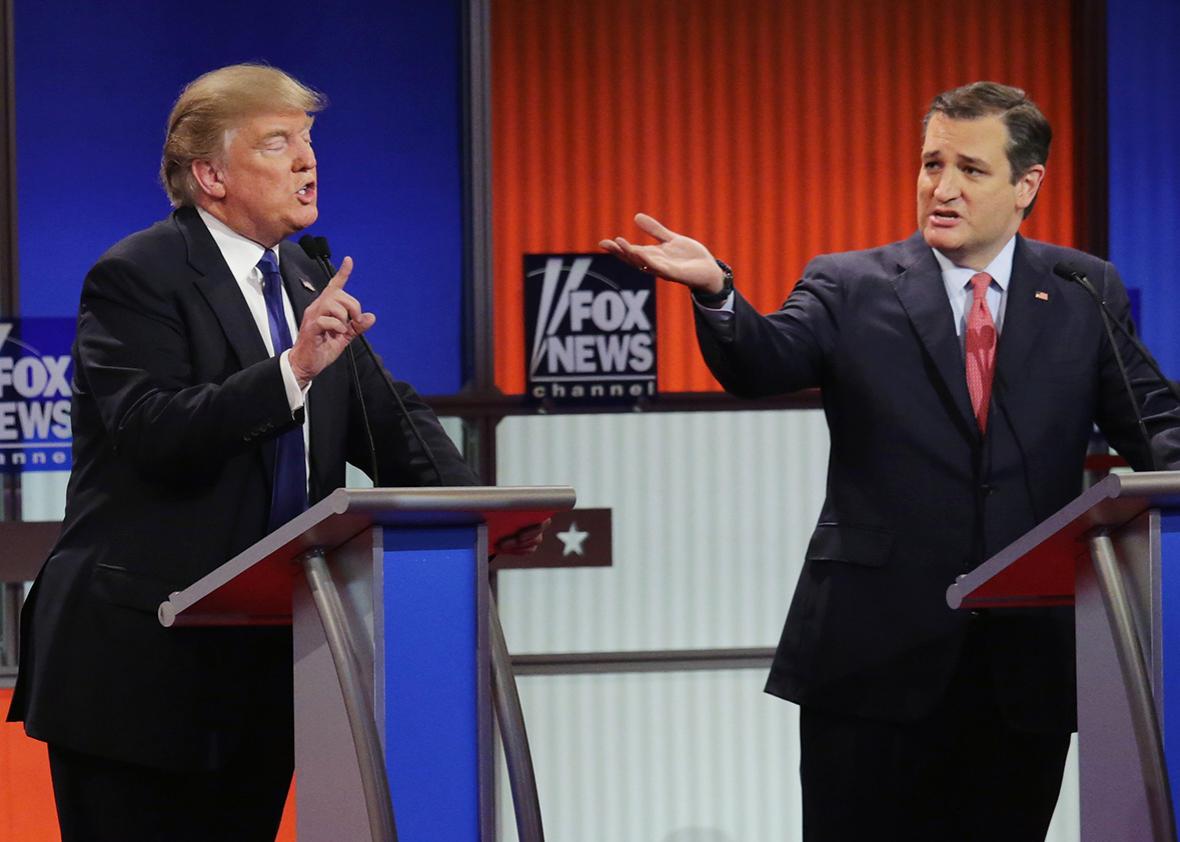Donald Trump is about halfway through his new pivot from using mostly harsh-sounding adjectives about immigrants to using nicer-sounding adjectives about immigrants, and reactions on the right are mixed.
Best-selling racist author Ann Coulter is disappointed but hasn’t disembarked the Trump Train just yet, openly comparing her devotion to Trump to how “the people of North Korea worship their Dear Leader.” Other immigration hard-liners are hoping that the so-called “softening” is just a hiccup, a brief concession to the consultant class, from which Trump will un-pivot soon enough.
Meanwhile, there’s a strong waft of I-told-you-so coming from the conservative movement’s Never Trump wing. National Review’s Jonah Goldberg is up with a post saying, “Jeb Called It,” quoting the felled Bush’s post-campaign interview with NBC News’ Nicolle Wallace during which he said that nothing Trump promised hard-liners is going to come to fruition.
And Politico reports that Texas Sen. Ted Cruz’s former presidential campaign backers “are quick to characterize Trump’s emerging position as amnesty.” Rick Tyler, former communications director for Cruz, says that “from what I have seen, [Trump] is now the pro-amnesty candidate.” He added that “[if] Trump is insistent on reversing himself on amnesty, then he will have fooled his entire base.” Amanda Carpenter, the CNN commentator who previously worked in Cruz’s Senate office, noted that “everything Trump promises comes with an expiration date.” Again, tol-ja-so was a big theme here. “We knew it during the primary, and now it is apparent he has duped his most loyal supporters on the issue they care about most, immigration,” Carpenter said. “Don’t say we didn’t warn them.”
Cruz and his allies did previously argue that Trump’s hard-line immigration rhetoric was something he’d abandon after the primaries. Not even after the primary, really. Cruz himself was saying during the primary that Trump was soft on immigration because he supported so-called “touchback” amnesty for undocumented immigrants—the idea that some of the “good ones,” as Trump likes to call them, would return to their home countries as a formality before being admitted back through the Trump Wall’s“big, beautiful door.”
Trump is a unique Republican presidential candidate in many ways, but his tonal moderation on immigration issues during the general election is not one of them. The I-told-you-so aspect of the campaign isn’t even very new here. In 2012 Mitt Romney, who encouraged “self-deportation” and exploited gaps in the immigration policy records of Rick Perry and Newt Gingrich to crush them during the primary, tried to “soften” his posture as soon as the nomination was relatively secure. Sen. John McCain, in 2008, was compelled to dial back his support for immigration reform during the primary; by May of that year he was right back on it. Whoever won the 2016 GOP primary would be “softening” by now—two or three months ago, really—because it’s obvious politics. Jeb Bush, Chris Christie, Marco Rubio, John Kasich, or any of the other alternative-reality GOP presidential nominees would probably personally be handing out green cards on the southern border at this point.
But not Ted Cruz, we’re led to believe. His people are spinning Trump’s shift as a confirmation of their own, risible theory throughout the primary that Republicans are best served electorally by a nominee who stands by his base-pleasing primary rhetoric. “It’s a mistake by the Trump campaign; it seems to be this attitude that the way to win a presidential campaign is to follow the playbook the Republicans enacted over the last few cycles: move to the middle during the general election,” Chris Wilson, the Cruz campaign’s former director of research, analytics and digital strategy, told Politico. “It’s not the campaign Ted Cruz would have run. It’s why we said from the very beginning, to win a general election, we need to nominate a conservative.” This is all part of Cruz’s positioning for 2020 in the eventuality that Trump loses.
If/when Trump loses, it will be, above all else, because he is visibly unqualified, at a level we’ve never seen, to be president of the United States. Lagging well behind that, but in a safe second, will be his hard-line immigration rhetoric, which alienated the nation’s fastest-growing demographic more than anyone else in Republican politics ever had. It’s doubtful that Trump’s pivot to friendlier adjectives will make a difference one way or another: Those he’s turned off will remain turned off, and his working-class white, male base will probably excuse him for this ostensible betrayal. But if he’s going to try moving in a direction to improve his chances, this is the right direction.
Team Cruz’s response shows what a missed opportunity the 2016 election will be for the Republican Party to at least answer a useful question, and how familiarly tiresome the 2020 primaries will be as a result. When the race came down to Trump versus Cruz, the thinking among establishment Republicans was that even if they despised Cruz, his nomination would give conservatives’ a chance to test their beloved theory: If only we nominated a real conservative instead of a mushy moderate, we would’ve won the general election. If it failed, which it probably would have, then that would be the end of that; if Cruz won, fine! Instead, with Trump, Republicans will be placing on the November ballot this weird referendum over celebrity-sponsored white nationalism that punts the conservative movement question to another election. Also, now Cruz and other hard-line conservatives get to say the party nominated another squishy moderate.
The main effect of Trump’s desperate, too-late nod toward treating certain undocumented immigrants like humans will be felt in four years, when Cruz, and whichever other candidates the conservative movement tosses up, use it to explain that Trump lost because he went all RINO in the general election. The real reason he will have lost is that he went total-jackass in the primary and the general, and was unqualified throughout. But now that’s not what the Republican Party will be forced to contend with come the next presidential election.
